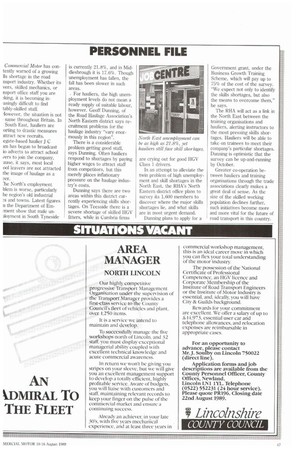PERSONNEL FILE
Page 49

If you've noticed an error in this article please click here to report it so we can fix it.
Commercial Motor has contently warned of a growing Ds shortage in the road nsport industry. Whether its vers, skilled mechanics, or nsport office staff you are !king, it is becoming in!asingly difficult to find tably-skilled staff.
Hlowever, the situation is not • same throughout Britain. In South East, hauliers are orting to drastic measures attract new recruits. egate-based haulier J C am has begun to broadcast io adverts to attract school ,rers to join the company, ause, it says, most local ool leavers are not attracted the image of haulage as a eer.
le North's employment blem is worse, particularly he region's old industrial and towns. Latest figures n the Department of Emrment show that male un)loyment in South Tyneside is currently 21.8%, and in Middlesbrough it is 17.6%. Though unemployment has fallen, the fall has been slower in such areas.
. For hauliers, the high unemployment levels do not mean a ready supply of suitable labour, however. Geoff Dunning, of the Road Haulage Association's North Eastern district says recruitment problems for the haulage industry "vary enormously in this region".
There is a considerable problem getting good staff, says Dunning. Often hauliers respond to shortages by paying higher wages to attract staff from competitors, but this merely places inflationary pressure on the haulage industry's costs.
Dunning says there are two areas within this district currently experiencing skills shortages. On Teesside there is a severe shortage of skilled HGV fitters, while in Cumbria firms are crying out for good HGV Class 1 drivers.
In an attempt to alleviate the twin problem of high unemployment and skill shortages in the North East, the RHA's North Eastern district office plans to survey its 1,600 members to discover where the major skills shortages lie, and what skills are in most urgent demand.
Dunning plans to apply for a Government grant, under the Business Growth Training Scheme, which will pay up to 75% of the cost of the survey. "We expect not only to identify the skills shortages, but also the means to overcome them," he says.
The RHA will act as a link in the North East between the training organisations and hauliers, alerting instructors to the most pressing skills shortages. Hauliers will be able to take on trainees to meet their company's particular shortages. Dunning is optimistic that the survey can be up-and-running by October.
Greater co-operation between hauliers and training organisations through the trade associations clearly makes a great deal of sense. As the size of the skilled working population declines further, such initiatives become more and more vital for the future of road transport in this country.


































































































































